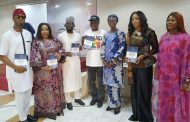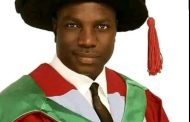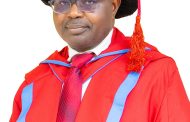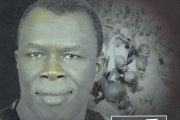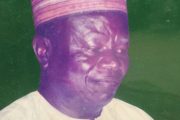Although it challenges conventional wisdom, Prof Michael Adikwu, the sitting Vice-Chancellor of Nigeria’s capital city university – the University of Abuja who is propounding it says that’s the way out if Nigeria wants to get it right in the educational sector. The way, for him, is in the post doctoral research system which he described as a systematic, top-down global approach.
The Vice-Chancellor who served as the Keynote Speaker at the first National Conference of the College of Education at Veritas University, Abuja today called it a wrong idea for anybody to think that Nigeria can reposition the educational system by first strengthening the nursery, primary and secondary schools in the hope that quality candidates would translate to quality learning. “If the top is not strong, there is nothing you can do about the lower system”, he said, adding that is how a top-down arrangement which can define what is quality and how to maintain it becomes essential.
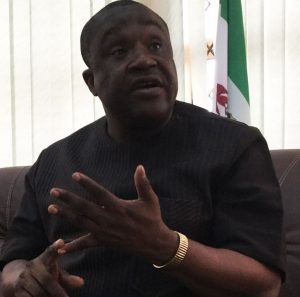
Prof Mike Adikwu, VC, University of Abuja and Keynote Speaker at the Veritas University conference
Professor Adikwu did not stop challenging conventional wisdom just at the level of where to start the re-positioning, he also disagreed with unqualified claims as to whether quality has fallen in Nigeria. Said the VC, “people say at conferences and events such as this that Nigerian graduates are unemployable but they do not say why”. For him, it is true that quality has climbed down but only in the sense that Nigeria’s curriculum is not matching up with what obtains outside the country. Otherwise, said the VC, children of today are far more versatile than their parents and those who proceeded this generation.
Prof Adikwu’s contention on the nature of the decline of quality clashed with the views of a subsequent lead speaker but the Vice-Chancellor had already left by then. Professor Ben Akpan, the Executive Director of the Science Teachers Association of Nigeria, (STAN) who spoke on “Education and Socio-Economic Development” argued that curriculum in Nigeria is one of the best in the world. In disagreeing with those who say the curriculum is bad or outdated, Prof Akpan said many countries in the world are still using their curriculum of the 1980s unlike Nigeria. For him, the crisis in the educational sector lies in policy inconsistency. “If we could implement 10% of our policies, we would go to the moon”, he said, asserting once again that the problem had never been curriculum.
But taking a comparative global view of his thesis earlier than Akpan, Professor Adikwu maintained how the greatness of the American, German, United Kingdom and the Japanese state, society and economy rests substantially on the post-doctoral research system. Speaking as someone who has been part of the system he is talking about in Japan, Germany and the UK, he said it is the way to restore the culture of research. Crediting products of post doctoral research with being the source of original ideas, the source of inventions which belongs to the institution they attended and the country, Prof Adikwu explains it is the reason that the Americans, for example, make allowance for concentration of highly talented individuals from different parts of the world. The same thing, he said, applies to Japan where, as soon as you are finishing your doctorate degree, you are off to somewhere else, most likely the United States for your post-doctoral research.
He contrasts the arrangement to what obtains in Nigeria where admission of foreigners is almost disappearing, a contrast to the period before today when, in his words, Nigeria was at par with any part of the world in terms of quality. Nigerians, he also said, were actually going straight to PhD programms of foreign universities with diploma and First Degree certificates. “Today, our PhD is not the equivalent of many foreign First Degree”, basically the sort of thing Professor Anthony Anwuka, the Minister of State for Education told members of Governing Councils of public universities recently. In the case of the Minister, he declared the universities to have let Nigeria down in terms of industrial leap. Nobody has replied him yet, either in agreement or disagreement.
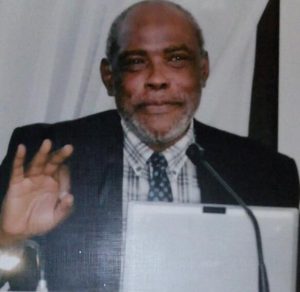
Prof Mike Kwanashie, VC, Veritas University, Abuja and conference Chief Host
The University of Abuja Vice-Chancellor believes Nigeria could finance post doctoral research system by setting aside some money in the bank and using the proceeds. Crediting education with being a force for holistic transformation of both its individual recipients and the society, Prof Adikwu, however, identified what he considers the many problems confronting the sector: inconsistency, corruption, weak and obsolete curriculum, industrial action, access problem, gender discriminations and inadequate quality schools, among others.
His argument is that unlike the earlier universities which bothered about whether faith is superior to reason or vice-versa, education in the 21st century is the all-rounder catalysts and Nigeria being confronted with many things in need of change has a challenge of re-positioning the educational system.
Two other lead speakers who took a rather conceptual pathway to the topic ended up with different sets of recommendations. Professor Joseph Haruna Mamman who favoured ‘active learning’ process rather than anything in the form of Paulo Freire’s ‘banking education’ recommended education for change and by which he meant qualitative, massive physical investment at all levels “to ensure, adequate and proper learning”. Professor Peter Tanko who also came from the Faculty of Education at the Ahmadu Bello University, Zaria like Professor Mamman articulated seven principles upon which education for unity could be based. But, uniting the principles is the thesis of the ‘Golden Rule’ of doing unto others what one would want done to him or herself. Prof Tanko’s emphasis on this is how the rule is common to virtually all religions, be it Christianity, Islam, Judaism, Zoroastrianism and what have you.
Prof Mike Kwanashie, Vice-Chancellor of Veritas University, Abuja and Chief Host of the conference who arrived the conference after Prof Adikwu had left said he looked forward to welcoming the University of Abuja VC to Veritas. He said Veritas does not have Federal Government resources but that he had a university he would have liked Adikwu to tour. “University is not buildings. It is the hearts of men and women”, he declared, adding his considered view that, on both the short and long run, education is the strategic response to the crisis of Nigeria’s development.
Professor Gabriel Egbe who stood in for Professor Kwanashie before his arrival had described the University of Abuja VC’s keynote address as insightful, deep and critical, saying that Veritas University, Abuja prides itself as providing education that transcends development of the cognitive component but also the competence, skills and attitudes to transform.
Professor Ben Uzoechi, the Dean of the College of Education told the gathering that the topic of the National Conference, “Repositioning Nigerian Educational System for National Consciousness, Unity and Socio-Economic Development” was arrived at after a thorough reflection by the College Board. He said certain things that put national unity in doubt and in question could be observed and it had become clear that national consciousness in Nigeria had fallen low. The conference, he said, is a response to that.




